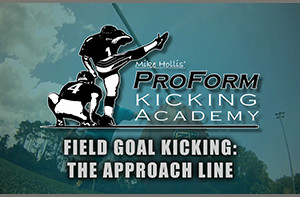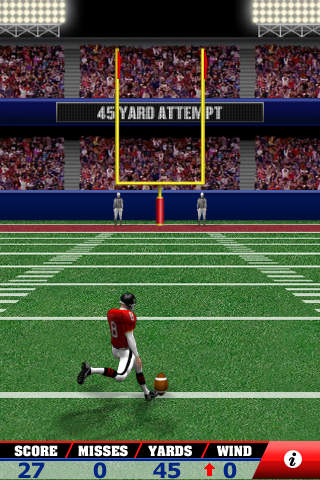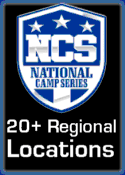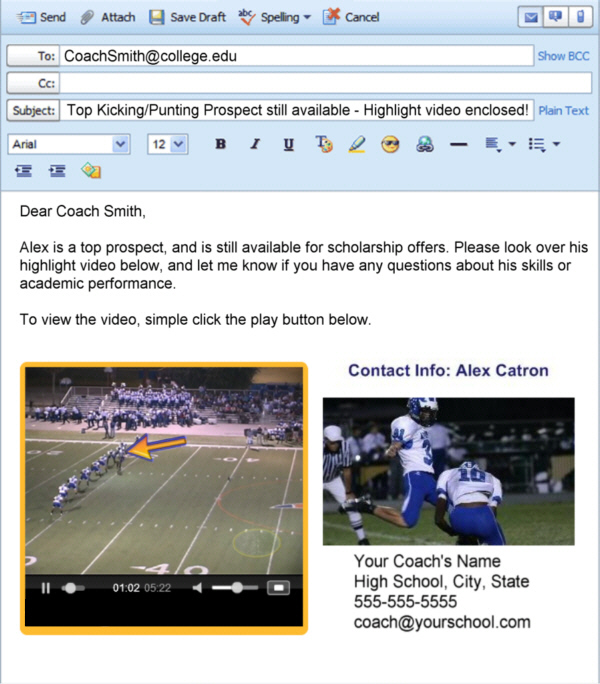|
GUEST EXPERT ARTICLE
Your senior year is finally here. Just like that your high school career is almost over. As your season begins, it is critical that you have a game plan for your transition to college. The reality is that there are few kickers or long-snappers that have an offer at this point. Much of the recruiting for football specialists occurs in the December/ January/February time period. Be prepared when this time comes. Here's how:
The first thing you have to make sure of is that you have plenty of quality film from your senior season. Don't just assume your high school manager is going to catch every kick on film. Often times those filming are more concerned with what happens to the protection (line) than your kick, punt or snap. If possible, have a friend or family member film your scrimmage and game performances as a back up. It is also wise to film your pre-game warm-up to have extra footage or to film certain kicks you may never get to attempt in a game (i.e. 50-yard field goal). Once you get to mid-season, begin putting together a short highlight film (see highlight video tips) with your best kicks, punts, snaps etc. By early November, your film should be sent to schools (you can always add more film later). Give your high school coach plenty of copies and tell him to hand one to every college coach that comes through your school. Always have your best overall complete game tape ready if a college coach asks for one. Some coaches will want to see more than a scripted highlight film (let your HS coach know which game to give to college coaches!).
Next you will want to work closely with your high school coach, guidance counselor and parents to continue researching colleges. Don't just look at football. Start with your desired major, school size, location, cost, setting etc. You have to come up with a 'Plan A' and a 'Plan B.' 'Plan A' is your best-case scenario. You have a list of desired schools and they all are heavily recruiting you. Scholarship offers via athletic or academic money are plentiful and a spot at each university through the football staff is not a problem. 'Plan B' is your back-up plan. This is you as a regular student applying to colleges based on your grades, test scores, extra-curricular activities, community service etc. You can then try to walk-on to the school's football program.
If you don't know where to look for schools, start with a college guide at your local bookstore and begin researching your options: I prefer RUGG's Recommendations on The Colleges. Make a long list of schools, highlighting the pluses and minuses of each. The Internet is also a great tool for college research. Every school has a web site, and most have athletic sites, too. For a complete list of football schools, divided by division and conference, visit www.afca.com and click on 'Football Facts' in the lower left hand corner. You can also try to keep track of who might be recruiting your position though this is a tough task because school recruiting needs are constantly changing.
As you research, make sure you are being realistic. Hopefully by now you have attended enough camps, combines etc. to gauge where you stand in terms of what level of college ball is a possibility. If you haven't or are looking for more exposure, attend the STS College Exposure Camp in December to compete against many of the top players at your position in front of college programs. Keep in mind the idea of going to a major university and playing in holiday bowl games is attractive to everyone, but it isn't a realistic goal for many. The reality is that very few kickers and punters can play at the Division 1-A level right out of high school. Shoot for the top, but don't ignore the lower-level schools. Besides offering outstanding football opportunities, non-Division I-A schools often rank among the most prestigious in terms of academic ratings. A few weeks of intense research might reveal your ideal school is in a place you never imagined, or perhaps it has been right under your nose all along.
Once you have identified a pool of schools, reach out to the football recruiting coordinator via e-mail, letter or phone call. Take an unofficial visit (all expenses are paid by the prospect) this fall and check out a game if you can. Most programs offer free tickets and pre-game recruiting tailgates to prospects where you can meet the coaches, see the facilities and even meet faculty. Once on campus, be sure to ask yourself: "If my football career ended tomorrow, could I be happy here as a regular student?" I cannot stress how important it is to make a decision based on a variety of factors, not just football. Make sure a school has everything you need in terms of major, academic support, atmosphere, size, location, career opportunities etc. Do not sell yourself short.
Assume everyone is recruiting a kicker, punter or long snapper at this point (even if they signed someone last year) and keep all options open. Familiarize yourself with NCAA football recruiting definitions and time lines by visiting www.ncaa.org and clicking on Academics & Athletes then Eligibility & Recruiting. Division I coaches may call once a week after September 1st and are permitted to visit your school on six selected days September-November (usually during a bye week). Official visits (paid by the school) usually occur in December, January and February with the major schools starting earlier and the smaller schools starting later. The national signing period begins in February and runs through April though most DI recruits will sign on the 1st possible day.
Finally, you might be the best player in the country, but it doesn't matter if you can't meet the NCAA's minimum academic standards. Studying should be the most important part of your daily routine. Don't be satisfied with merely meeting the NCAA's standards. Exceed them. Maintain strong grades through your senior year! Imagine this scenario: A college is looking at two players. One is the ideal fit for their system, but his academic profile is weak. The other is the school's second choice, and his grades are fantastic. Which one will they choose? You know the answer. If you keep your grades up, you will be operating from a position of power. Be sure to register with the NCAA Clearinghouse (www.ncaaclearinghouse.net) so the NCAA can academically certify you to compete as a freshman for a Division I or II school. There is no certification for Division III as academic standards are up to each respective school and conference.
In closing, be proactive in your recruiting. Take responsibility. Consult with your parents, teachers, counselor, coach, kicking instructor etc. before making the most important decision of your life. Do not get too up or too down about what any one coach says. Nothing is solid until you have an offer on the table. Until then, pursue all avenues and most importantly, enjoy the experience! Best of luck in pursuing your dream! Learn more about Lee McDonald >>> |

 Recruiting Realities: Fall of Senior Year
Recruiting Realities: Fall of Senior Year


 Doug and Tommy's Frequently Asked Questions
Doug and Tommy's Frequently Asked Questions




